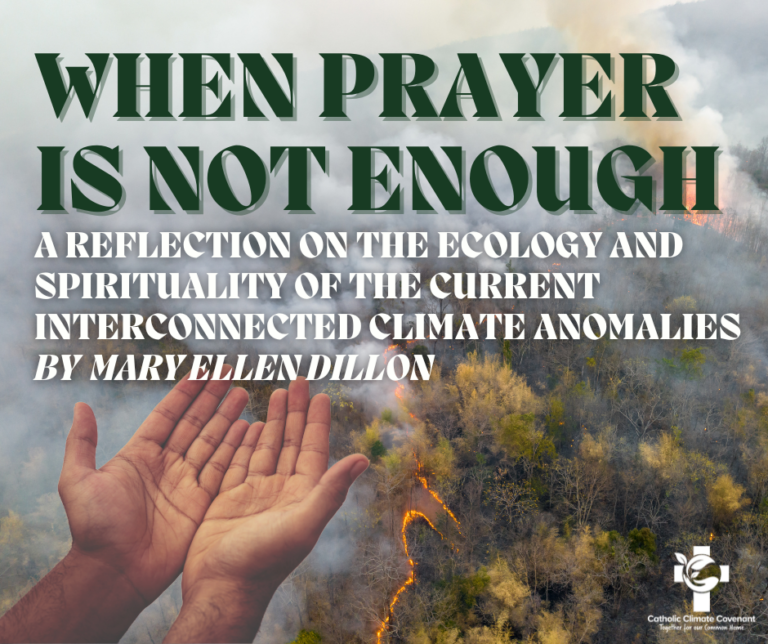The following blog is reposted from Marianist Encounters.
To say it’s hot outside is an understatement. I’m writing this in Ohio during an unprecedented heatwave in June 2024. The average daily temperatures are more than 15 degrees Fahrenheit above normal. The high temperatures for June 16-19, technically the last four days of spring, were over ninety degrees. The weather is so hot that the wax head of a Lincoln statue in Washington, D.C., melted off.
The science is clear. The current climate change, i.e., human-induced global warming, has been directly caused by a recent surge of CO2 in our atmosphere. Tiny trapped air bubbles, mined deep from layers of Antarctic ice, tell the scientific tale. Atmospheric CO2 levels have rhythmically risen and fallen, along with temperature, in cycles spanning thousands and thousands of years … long before humans ever walked the Earth. Over the last seventy years, however i.e., in the span of a single human lifetime, atmospheric carbon levels have skyrocketed. Current levels far exceed the normal, i.e., natural, “highs” of the millennia.

This dramatic increase in a naturally occurring greenhouse gas has had a “domino effect.” More heat means more evaporation, which means more precipitation. Thus, record heat waves have been accompanied by record droughts, rains, and floods. Buried in our news feeds are devastating disasters directly related to these climatic aberrations, such as the 2022 Pakistan flooding described by Marianist Brother Larry McBride. (Please read!) One-fifth of the country was flooded due to severe monsoons coupled with glaciers melting due to record-setting heat waves. This convergence of non-natural natural events affected thirty-three million Pakistanis, half of whom were children. The floods displaced millions, destroyed schools and roads, and increased the incidence of water-borne diseases. Did we hear the cry of the poor as we went about our own daily activities? Did we say a quick prayer, thinking that is all we could do for the Pakistani population, who ironically contribute a mere 1% of global carbon dioxide emissions?
The uncomfortable truth is that Western nations, particularly the U.S., are responsible for the lion’s share of the carbon dioxide released, both through direct emissions and through the demand for goods produced by China.
And now we are experiencing an extreme heat wave that, for many, is inconvenient and, for some, is life-threatening. A quick internet search will show record-breaking and dangerous droughts, hurricanes, heat waves, and flooding affecting our own country. Thus, our own irritations and suffering are coupled with the suffering of societies having fewer resources to cope with these disasters. Our plights and the plight of the planet are interconnected. Pope Francis recognized this interconnectedness when he addressed his 2015 encyclical, Laudato Si‘, to “every person living on this planet” (LS, 3).

For people of faith, there is value in being mindful of our mutual, even if largely disproportional, suffering. There is grace in spiritually linking our sufferings, large and small, and praying for all affected. But prayer alone is not enough. Not when we can control two critical lifestyle factors having enormous ecological impact: our cooling and cuisine.
The air conditioning (AC) we are privileged to enjoy is very energy intensive, accounting for about 20% of U.S. home electrical consumption and releasing tons of carbon dioxide. On the other hand, electric fans consume a mere 1% of the energy that AC uses. In fifteen minutes, an AC unit consumes as much energy as a fan running all night and day. Older generations remember when ceiling, window, and stand-alone fans were common. Now, in the summer, we wear sweaters in restaurants to protect ourselves from the intense AC-induced cold that is ironically amplifying the intense heating of our planet.
Yet, we can choose … to do… differently. Until temperatures are well above 90 degrees Fahrenheit using fans is not only comfortable but healthier as AC depletes moisture from the air, moisture that allows our lungs to function well. It’s easy to research what fans work best in your home!
Another lifestyle and cultural factor we can control is our level of meat consumption. For many reasons, meat production and transportation have a high carbon footprint. Thus, we should view meat, especially beef, as an ecological luxury item. Consider eating beef, if you choose to do so, only on special occasions and only if purchased from local producers employing antibiotic-free methods.
Specific concrete actions one can take include joining the Marianist Meatless Mondays movement as well as adopting the traditional faithful fasting on Fridays. Encourage friends and family who do eat meat to avoid buying meat, especially beef, from Walmart, Costco and Kroger, whose purchases (from the international food company JBS) directly contribute to deforestation in the Amazon.


In the words of Pope Francis, “We must not think that these efforts are not going to change the world. They benefit society, often unbeknown to us, for they call forth a goodness which, albeit unseen, inevitably tends to spread” (LS, 212).
Thus, good people of faith should increase our use of electric fans (while encouraging our churches and businesses to do the same) and decrease our consumption of meat. Some climate mitigating strategies must be addressed at the policy level, but these are two actions that individuals can take. No company or government committee controls how you cool or what you eat. Both actions may require minimal inconvenience but individually and collectively produce major health, environmental, and even economic benefits.
Likewise, we might consider contemplating the effect of our daily activities, positive or negative, on the vulnerable. We can mindfully connect our concrete actions to a spiritual awareness of the plight of the poor and the plight of our life-sustaining planet. As Francis writes, “There is a nobility in the duty to care for creation through little daily actions” (LS, 211).
For our futures are indeed interconnected. Perhaps only the Holy Spirit can change the hearts and minds of those whose actions — through selfishness or ignorance — threaten the well-being of all. So yes, we most definitely should pray. But prayer is not enough. Let’s try fans, food, and following the lead of Francis.
Mary Ellen Dillon of the Micah 6:8 Lay Community is a Principal Lecturer in the Biology Department as well as a Hanley Sustainability Scholar at the University of Dayton. She sends us this guest reflection on the ecology and spirituality of the current interconnected climate anomalies. She is part of Catholic Climate Covenant’s Common Home Corps in the Diocese of Cincinnati. Her Common Home Corps leader is Tiffany Hunsinger, a PhD student in Theology at the University of Dayton specializing in traditional Catholicism and politics in the United States.


